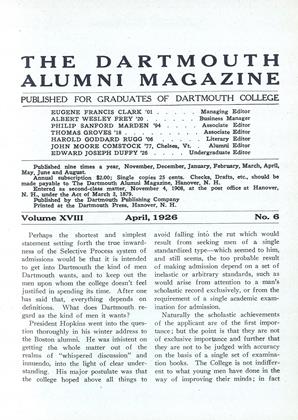Under the, plan of the new curriculum which will go into effect with the beginning of the next college year the various departments are drawing up their outlines for major study. The Department of Greek in announcing its major plan has published the following statement:
The Department of Greek, although it does not wish to appear in the role of apologist, feels that it would not be superfluous to state briefly and in general terms its ideas regarding a major in Greek before proceeding to a statement of the specific requirements.
It believes, first and foremost, that Greek literature, like any other, must stand or fall by the test of beauty; that is, beauty of form and beauty of content; —such beauty of form as is to be found in the intricate design of the choral odes in tragedy and in the infinitely complex periods of Thucydides; such beauty of content as in the great books of the Iliad, the tragic poets, and the Platonic dialogues.
But it also believes that there is, in addition to this intrinsic beauty, an adventitious beauty, that has come about through the long passage of the years. It feels that the Iliad is of greater interest and has deeper meaning because Alexander slept with it under his pillow on. those mighty campaigns in the far lands beyond Babylon; that Sophocles is more appealing because his plays were found on the body of the drowned Shelley; and that Aristotle is more significant because Dante called him "the master of those who know." It believes that, in its perennial inspiration to the poets of all ages, Greek literature has indeed been the "chief nourisher in life's feast."
The department does not wish to stress, although it does recognize, the disciplinary value of Greek. It feels rather that the disciplinary value should be considered incidental.
There is, too, a further consideration. Greek civilization presents a culture that is not only fundamental in the study of our modern life, but it also gives us the opportunity of viewing a culture in its entirety. We can trace it from a comparatively primitive stage to its height and through its decline to the end, —if, indeed, it may be said ever to have ended. Not only is it important because of its completeness and its independence, but also because of its differences from our own civilization. In the study of ancient Greek life we see a civilization which developed independently a high form of intelligent society, one which devoted itself to the arts and sciences, to philosophy and religion, to statecraft and, in fact, to all the concerns of what we consider to be modern, as well as ancient, life.
It is with these ideas in mind that the Greek department constructs and aims so to design its major that
1. The student may, as a result of his study, have trained his mind adequately for undertaking the problems incident to life in modern society.
2. May appreciate the significance to ourselves of Greek thought.
3. May achieve a large and unified conception of Greek life.
4. And, chiefly, that he may come to know some of the ancient beauty created by the Greeks and recreated in the minds of poets throughout the ages.
 View Full Issue
View Full Issue
More From This Issue
-
 Article
ArticleHUNTING FOR MISSING LINKS IN SPITSBERGEN
April 1926 By Professor William Patten -
 Article
ArticlePerhaps the shortest
April 1926 -
 Article
ArticlePIKE'S ARITHMETIC
April 1926 By Professor Bancroft H. Brown -
 Article
ArticleTHE UNDERGRADUATE CHAIR
April 1926 -
 Class Notes
Class NotesCLASS OF 1914
April 1926 By Herbert S. Austin -
 Class Notes
Class NotesCLASS OF 1916
April 1926 By H. Clifford Bean
Article
-
 Article
ArticleDARTMOUTH TO GET $10,000 BY WILL OF MRS. HUBBARD
March, 1924 -
 Article
ArticleTabulation of Income and Expense for 1944-45
November 1945 -
 Article
ArticleE. Morton Jennings Jr. '28 was tendered one of Dartmouth's coveted Alumni
October 1978 -
 Article
ArticleCrossing the Green
NOVEMBER 1984 -
 Article
ArticleDESCRIBE THE KIND OF FRIDAY NIGHT YOU'D LIKE TO SEE AT DARTMOUTH FIVE YEARS FROM NOW.
SEPTEMBER 1991 -
 Article
ArticleTuck School
May 1955 By H. C. MORTON


